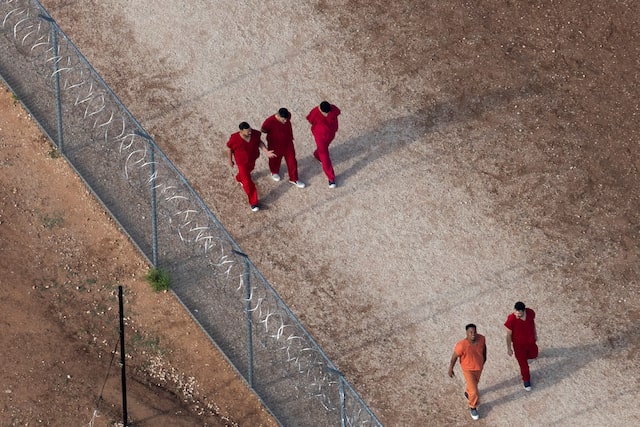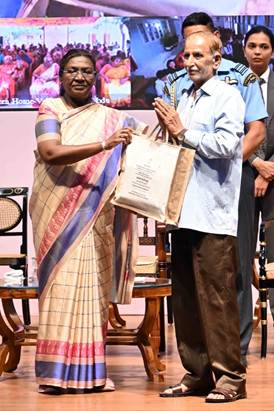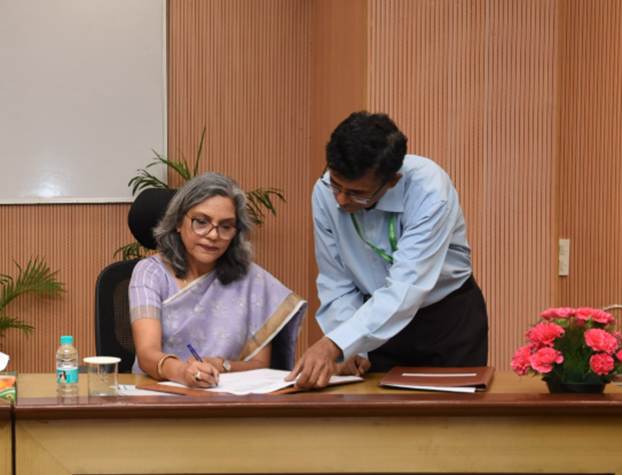An aerial view shows Diover Millan of Venezuela, top left, and other detainees at the Bluebonnet Detention Facility, the facility where Venezuelans at the center of a U.S. Supreme Court ruling are held, in Anson, Texas, U.S., April 23, 2025. REUTERS
Summary
- Judge halted the termination of temporary legal status
- Trump has pursued hard-line policies on immigration
WASHINGTON, (Reuters) – President Donald Trump’s administration asked the U.S. Supreme Court on Thursday to intervene in its bid to strip temporary protected status for more than 300,000 Venezuelan migrants, a move that would clear the way for their deportation from the United States.
The Justice Department asked the justices to put on hold a federal judge’s order that halted Homeland Security Secretary Kristi Noem’s decision to terminate the temporary legal status that previously was granted to some Venezuelans.
“So long as the order is in effect, (Noem) must permit hundreds of thousands of Venezuelan nationals to remain in the country, notwithstanding her reasoned determination that doing so is ‘contrary to the national interest,'” Justice Department lawyers wrote in court papers.
The Temporary Protected Status, or TPS, humanitarian program is available to people who cannot return safely to their home country due to natural disaster, armed conflict or other extraordinary event.
The administration’s request came in a lawsuit by a group that includes several Venezuelans living in the United States and the National TPS Alliance, which advocates for immigrants who have been granted temporary protected status.
The Supreme Court directed the challengers to respond to the administration’s request by May 8.
The lawsuit challenged Noem’s decision in February to terminate one portion of the TPS designation for Venezuela, reversing an action by the U.S. government under Trump’s Democratic predecessor Joe Biden to extend the temporary protections for nationals of the South American country. Those protections had been in place since 2021.
Justice Department lawyers in their Supreme Court filing said the lower court had “wrested control of the nation’s immigration policy away from the Executive Branch.”
“The court’s order contravenes fundamental Executive Branch prerogatives and indefinitely delays sensitive policy decisions in an area of immigration policy that Congress recognized must be flexible, fast-paced, and discretionary,” they wrote.
The move to end TPS for Venezuelans is part of Trump’s broader immigration crackdown.
U.S. District Judge Edward Chen in San Francisco blocked the administration’s move to end the protections for the Venezuelans, saying Noem’s actions appear to have been predicated on “negative stereotypes” by insinuating the migrants were criminals.
“Generalization of criminality to the Venezuelan TPS population as a whole is baseless and smacks of racism predicated on generalized false stereotypes,” Chen wrote, adding that Venezuelan TPS holders were more likely to hold bachelor’s degrees than American citizens and less likely to commit crimes than the general U.S. population.
The San Francisco-based 9th U.S. Circuit Court of Appeals on April 18 declined the administration’s request to pause the judge’s order.
The case is separate from the legal fight over Trump’s deportations of Venezuelan migrants under a 1798 law historically used only in wartime.
The Supreme Court on April 7 placed limits on how deportations under the Alien Enemies Act may occur even as the legality of that law’s use for this purpose is being contested. The justices required that detainees receive notice “within a reasonable time and in such a manner” to challenge the legality of their removal.
The Supreme Court on April 19 temporarily barred the administration from deporting the migrants under the Alien Enemies Act after their lawyers said the government was set to remove the men from a Texas detention center without judicial review in violation of the Supreme Court’s prior order.
The administration has accused those Venezuelan migrants of being members of a Venezuelan gang that the State Department has designated as a foreign terrorist organization.
Lawyers and family members of the migrants have disputed that allegation.
The administration has sent deportees to El Salvador, where they are being detained in that country’s maximum-security anti-terrorism prison under a deal in which the United States is paying President Nayib Bukele’s government $6 million.
Reporting by Andrew Chung in New York and John Kruzel in Washington; Editing by Will Dunham





